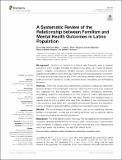Mostrar el registro sencillo del ítem
A systematic review of the relationship between familism and mental health outcomes in Latino population
| dc.creator | Valdivieso Mora, Esmeralda | |
| dc.creator | Peet, Casie L. | |
| dc.creator | Garnier Villarreal, Mauricio | |
| dc.creator | Salazar Villanea, Mónica | |
| dc.creator | Johnson, David K. | |
| dc.date.accessioned | 2017-07-04T20:37:19Z | |
| dc.date.available | 2017-07-04T20:37:19Z | |
| dc.date.issued | 2016-10-25 | |
| dc.identifier.citation | http://journal.frontiersin.org/article/10.3389/fpsyg.2016.01632/full | |
| dc.identifier.issn | 1664-1078 | |
| dc.identifier.other | PMCID: PMC5078495 | |
| dc.identifier.uri | https://hdl.handle.net/10669/30177 | |
| dc.description.abstract | Background: Familismo or familism is a cultural value frequently seen in Hispanic cultures, in which a higher emphasis is placed on the family unit in terms of respect, support, obligation, and reference. Familism has been implicated as a protective factor against mental health problems and may foster the growth and development of children. This study aims at measuring the size of the relationship between familism and mental health outcomes of depression, suicide, substance abuse, internalizing, and externalizing behaviors. Methods: Thirty-nine studies were systematically reviewed to assess the relationship between familism and mental health outcomes. Data from the studies were comprised and organized into five categories: depression, suicide, internalizing symptoms, externalizing symptoms, and substance use. The Cohen’s d of each value (dependent variable in comparison to familism) was calculated. Results were weighted based on sample sizes (n) and total effect sizes were then calculated. It was hypothesized that there would be a large effect size in the relationship between familism and depression, suicide, internalizing, and externalizing symptoms and substance use in Hispanics. Results: The meta-analysis showed small effect sizes in the relationship between familism and depression, suicide and internalizing behaviors. And no significant effects for substance abuse and externalizing behaviors. Discussion: The small effects found in this study may be explained by the presence of moderator variables between familism and mental health outcomes (e.g., communication within the family). In addition, variability in the Latino samples and in the measurements used might explain the small and non-significant effects found. | es_ES |
| dc.description.sponsorship | Support from NIA Developmental Grant R21TW009665 and the University of Kansas Open Access Author Fund. | es_ES |
| dc.language.iso | en_US | es_ES |
| dc.rights | CC0 1.0 Universal | * |
| dc.rights.uri | http://creativecommons.org/publicdomain/zero/1.0/ | * |
| dc.source | Frontiers in Psychology 7:1632 | es_ES |
| dc.subject | familism | es_ES |
| dc.subject | depression | es_ES |
| dc.subject | suicide | es_ES |
| dc.subject | substance abuse | es_ES |
| dc.subject | internalizing | es_ES |
| dc.subject | externalizing | es_ES |
| dc.subject | latino | es_ES |
| dc.title | A systematic review of the relationship between familism and mental health outcomes in Latino population | es_ES |
| dc.type | artículo original | |
| dc.identifier.doi | 10.3389/fpsyg.2016.01632 | |
| dc.description.procedence | UCR::Vicerrectoría de Investigación::Unidades de Investigación::Ciencias Sociales::Instituto de Investigaciones Psicológicas (IIP) | es_ES |
| dc.identifier.pmid | 27826269 |
Ficheros en el ítem
Este ítem aparece en la(s) siguiente(s) colección(ones)
-
Psicología [597]



